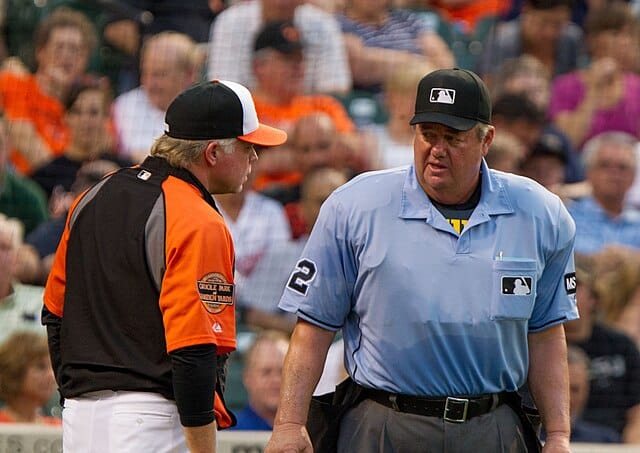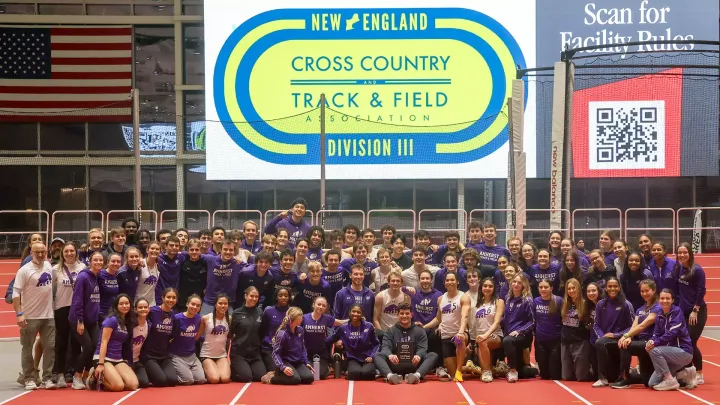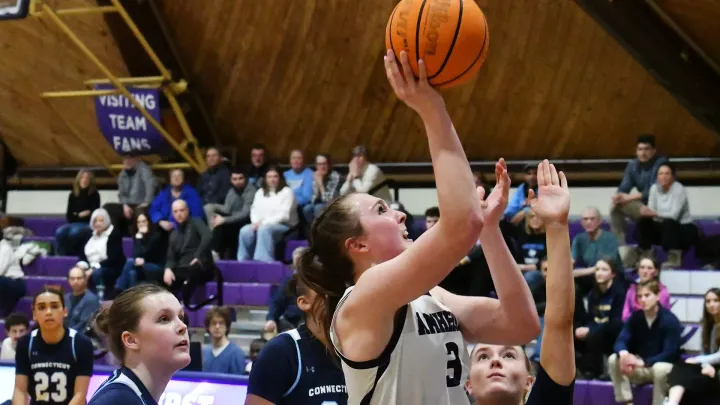‘A Wine-Dark Sea’: The Mammoths Win it All
After losing in the NCAA championship final twice in the last four seasons, men’s soccer has finally broken through to win the tournament. Assistant Sports Editor Toby Rosewater ’28 sat down with the team and coach to discuss their road to victory.

“Much have I suffered, labored long and hard by now in the waves and wars. Add this to the total — bring the trial on!”
The quote comes from Book Five of the Odyssey, wherein Odysseus reaffirms his desire to overcome the divine roadblocks stalling his return home. Coach Justin Serpone shared these words with his team before last Thursday’s NCAA semifinal win against Middlebury.
In that context, returning home would be winning the Division III (DIII) national championship, an honor the Amherst men’s soccer team has not had since 2015. Alas, it has been a tantalizing few years for Amherst. The team reached the national championship game in 2021 and 2023 but fell short both times. “There are 418 teams in DIII men’s soccer,” Serpone told me. “It’s really hard to climb the mountain, and it takes everything you have.” Going into Saturday’s final, then, Amherst had outlasted all of the 417 soccer teams in the country but one: Connecticut College. “[They’re] a really good team,” Serpone said.
Indeed, the Camels are great. They won the NESCAC championship this year and defeated Amherst in penalties along the way. In fact, Conn College is the same school that defeated Amherst after 110 minutes of play and penalties in the 2021 national championship. Therefore, as Serpone put it: “It would have been really easy for [the team] not to have opened themselves up to the possibility of heartbreak again.”
As the opening whistle blew 2,600 miles from campus in Las Vegas, Nevada, the possibility of heartbreak loomed once more. Like many championship games, after 15 minutes of scoreless play, it became clear the match would be a low-scoring, physically taxing marathon. Eventually, with about 15 minutes left in the half, Fynn Hayton-Ruffner ’25 delivered, burying a shot past the keeper. It was a moment of euphoria — a fleeting moment of joy — but it wasn’t meant to be: the assistant referee quickly ruled Ruffner off-sides and disallowed the goal, keeping the game scoreless at half.
In the following frame, Amherst had all the momentum. Chances from Niall Murphy ’25, Michael Cherico ’28, and Simon Kalinauskas ’25 all punctuated the Mammoths’ search for a winner. “It felt like a goal was coming,” Serpone said. In time, the big chance came at the end of regulation when a clearance header from Murphy set up an excellent touch from Mohammed Nuhu ’27. With an air of composure, Nuhu raced down the line and, with a defender in his face, struck the ball with his left. Again — it wasn’t meant to be. Peter Silvester, the Conn College keeper, leaped through the air and swatted it away.
With that, regulation ended, overtime began, and both teams, exhausted yet awfully driven, regrouped for another grueling 20 minutes of play. From then on out — everyone knew — each touch carried the weight of a season’s ambition, and every mistake could spell the end. Before long, though, 20 minutes had passed, and indeed, the match was headed to penalties.
Amherst was ready. In the weeks following their loss to Conn College in the NESCAC quarterfinal, the team regrouped and began practicing penalties on Hitchcock Field. Among the standouts were three first-years: Jacob Lalou, Sam Davis, and Jacob Dinzeo, all of whom got the nod to take penalties in the final. “I trust all of the guys on the roster to hit penalties,” Serpone said. “After Conn beat us in the NESCAC quarterfinals, we had the chance to reset our penalty lineup, and some of the first-years were great in training, so we went with them.”
Goalie Max Landa ’25 started the shootout with a diving save, putting Amherst up early. Landa has been a standout for the Mammoths all season, and Saturday was no different. Where others make mistakes in pen, Amherst writes in pencil, and Landa is the eraser. “We have the best keeper in the country,” Nuhu told me, who, after Landa’s save, quickly scored his own penalty. “I might sound crazy,” he joked. “I was very confident in the penalty kicks. I am always confident I am going to score.” A few kicks later, Lalou scored as well. “Jacob is the best representation of what it means to find a role and crush it,” Serpone said. “He hasn’t played one second in the last five weeks, but he hit two high-pressure, crucial penalty kicks. Absolutely incredible.”
As the penalties dragged on and Jacob Dinzeo scored his kick, the shootout drew even at 3-3. Once again, Landa had to deliver — and deliver he did. Landa willed Amherst into a winning position with a diving stop to his left, setting up Kalinauskas for the win. I asked Kalinauskas about his thought process going into the kick. “I don’t think there was really much I was thinking about. I just wanted to execute the penalty how I practiced them on Hitchcock field throughout the season,” he said. And so, Kalinauskas gently placed the ball on the spot, walked a few paces back, and fired.
“Simon Kalinauskas for Amherst … smashes it home! And the Mammoths finally break through and win the national championship!”
To return to the Odyssey, Homer famously describes the ocean as a “wine-dark sea.” You see, the Greeks didn’t have a word for the color blue, and in a way, I don’t think the Mammoths do either. This team has never been blue — at least not outwardly — and they have never stopped wanting to climb the mountain. There is something uniquely gritty about this team — something that only a team with a senior class who trained through Covid and lost the national championship twice could possibly capture. In that sense, for this team — and those seniors — there is no better ending than this one.





Comments ()